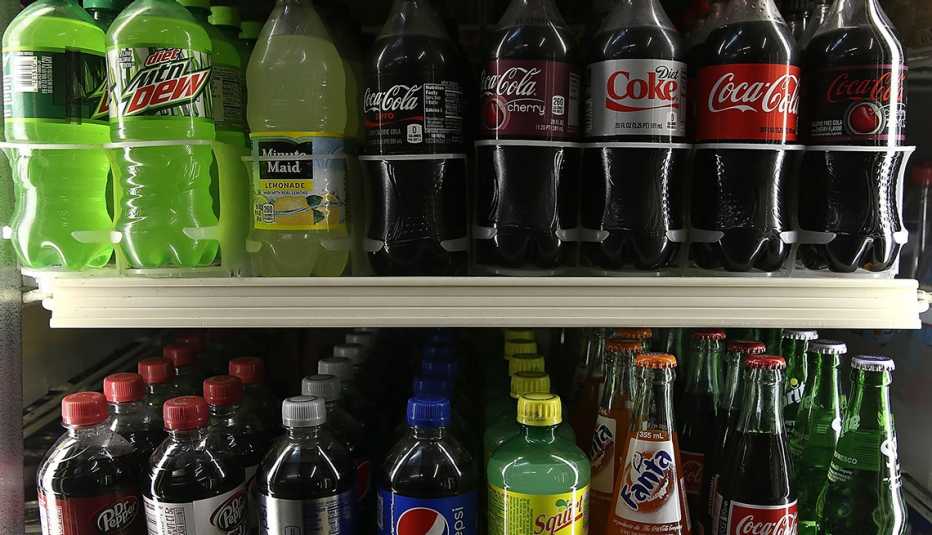What's The Real Story About the Danger of Soft Drinks?
Whether you call it a soft drink, soda or pop, you’ve probably noticed that every few months one study or another comes out detailing their health risks. Now, new research published earlier this month in JAMA Internal Medicine offers an even more sobering message: Just two glasses per day of these drinks, whether they’re sweetened with sugar or artificial sweeteners, raises the risk of premature death by 17 percent, compared to those who sip them less than once a month.
But studies on soft drinks can be confusing because some of them aren’t well controlled, says Bonnie Liebman, director of nutrition at the Center for Science in the Public Interest. “Many of these studies are observational studies, which means researchers are relying on people’s memories and recall, which can be problematic,” she explains. In addition, it’s often impossible to tease out whether the effects are due to reverse causation — that is, study subjects “may be drinking diet drinks because they are already overweight, and thus many of their health problems can stem from that,” Liebman notes.
Here’s a look at what the research shows, and a bottom line for you.
Stay away from sugary drinks, period
A study published earlier this year in the journal Circulation followed over 118,000 men and women for 30 years and concluded that each daily 12-ounce serving of a sugar-sweetened beverage — including soft drinks, lemonade and other sugary fruit drinks — raised the risk of death by 7 percent, including a 5 percent increased risk for cancer death, and a 10 percent increased risk for death from cardiovascular disease. “Sugary drinks lead to weight gain, and anything that leads to weight gain increases risk of conditions such as heart disease, type 2 diabetes and even certain cancers,” explains Liebman. There are also other ingredients that may come into play. “Soft drinks are made up of carbonated water, and there is some preliminary research that suggests carbonated water may increase levels of the hunger hormone ghrelin, thereby making one hungrier, and that may lead to weight gain,” adds Nancy Farrell Allen, a spokesperson for the Academy of Nutrition and Dietetics and a registered dietician in Fredericksburg, Virginia.
Bottom line: Indulge in these drinks once a month, or less. “We know now that added sugars can cause inflammation in bodies, and we already have a high sugar diet to begin with,” points out Erin Coates, a nutritionist at the Cleveland Clinic. One can of Coca-Cola, for example, contains 39 grams of added sugar, well above the American Heart Association’s maximum recommendations of 25 grams for women and 36 for men.
Limit diet drinks
You can’t live without your afternoon Diet Coke, or you crave that Diet Sprite at dinner. But research shows diet soft drinks may carry health issues, too. The JAMA study, for example, found that while drinking two or more sugar-sweetened beverages a day raised the risk of death by 8 percent, those who drank artificially sweetened drinks had a 26 percent higher risk.


One reason may be that diet sodas, instead of satisfying our sweet tooth, leave us craving for even more. “They are 300 to 500 times sweeter than sugar, increasing our desire for more and more sweet foods or beverages,” says Farrell Allen. “We would never add 300 sugar cubes to our cup of coffee. But non-nutritive sweeteners give this false sense of what I call ‘caloric security.’” In other words, you don’t think twice about pairing a cheeseburger with your Diet Coke because, after all, you’re sipping zero calories. “In my experience, clients who drink diet soft drinks almost always aren’t satisfied with the drink alone — they want a sweet or salty food to go along with it,” adds Coates.
Another concern may be some of the chemicals, including the artificial sweeteners, found in diet soft drinks, adds Liebman. Aspartame — found in drinks like Diet Coke — has in the past been linked to cancers such as lymphoma and leukemia in lab animals. While later research has been more reassuring, a 2012 study published in the American Journal of Clinical Nutrition did find that men who drank at least one diet soda a day had a higher risk of two cancers, multiple myeloma and non-Hodgkin lymphoma, than men who didn’t drink any at all. Some other diet soft drinks contain sucralose (Splenda), which has also been linked to cancer in animals.




